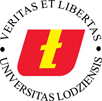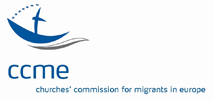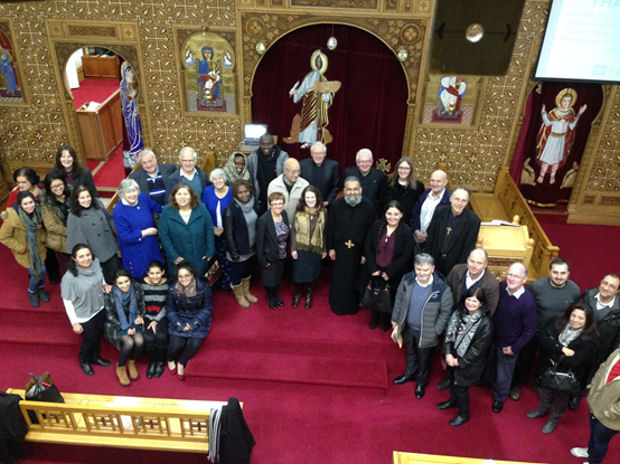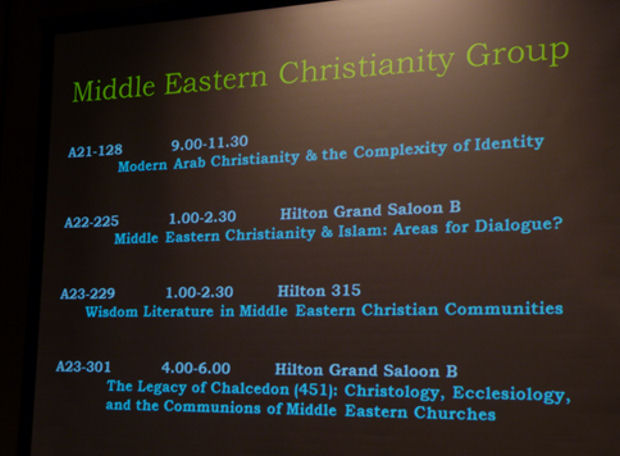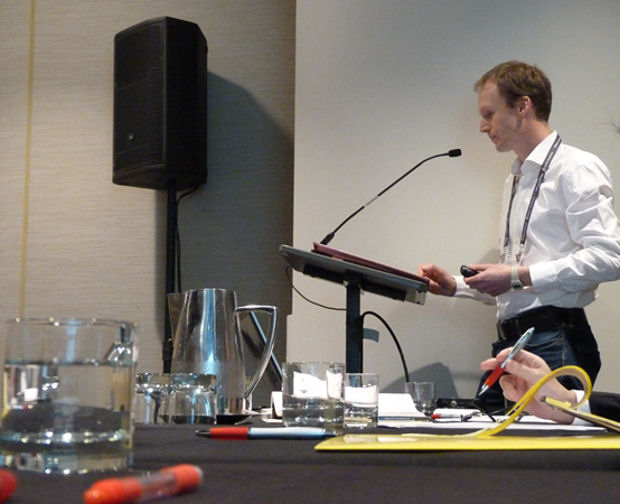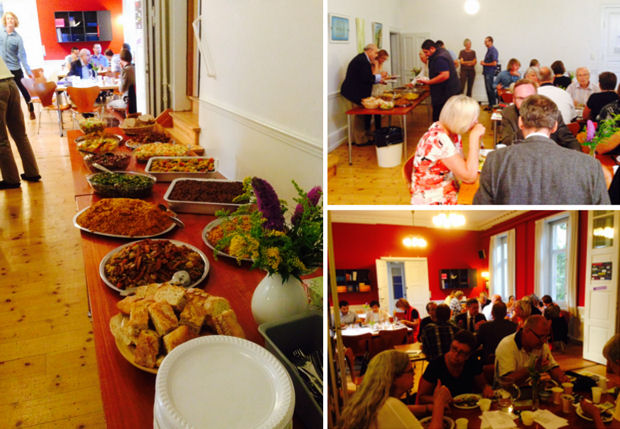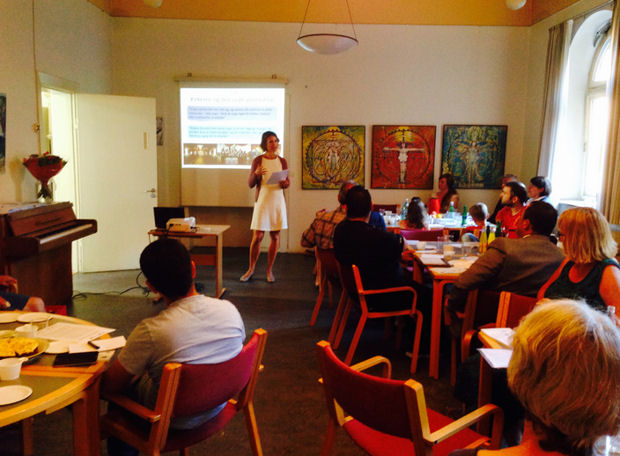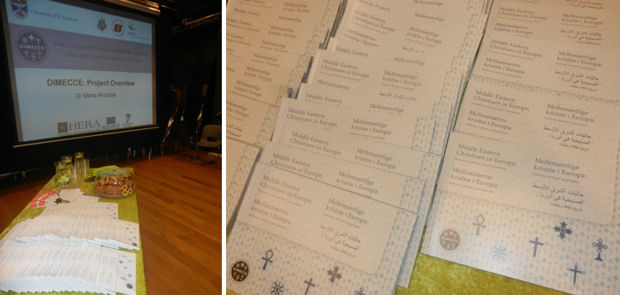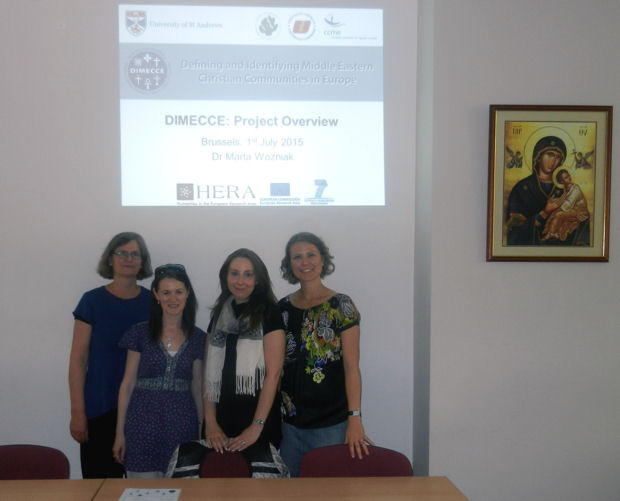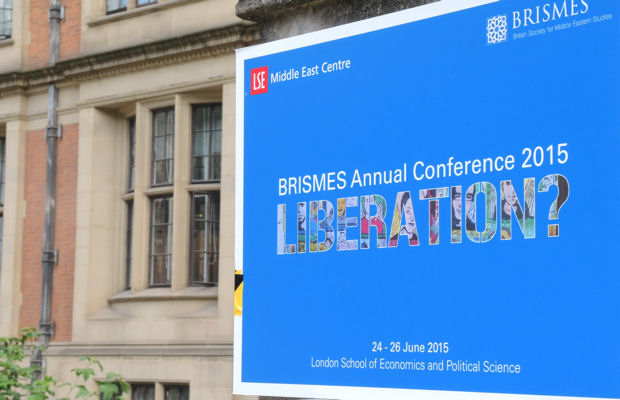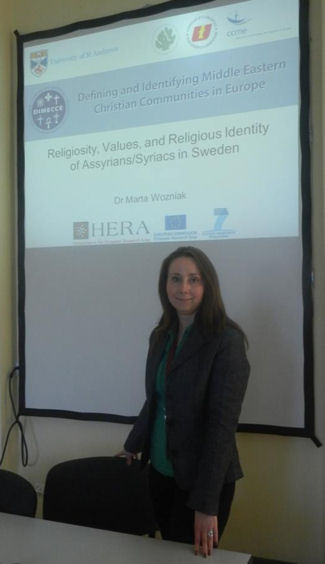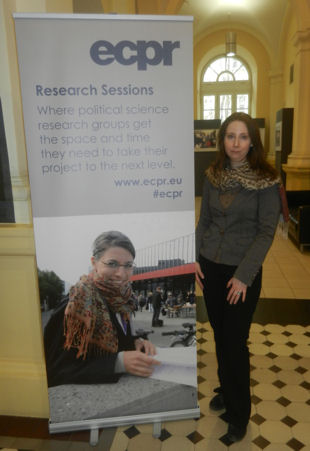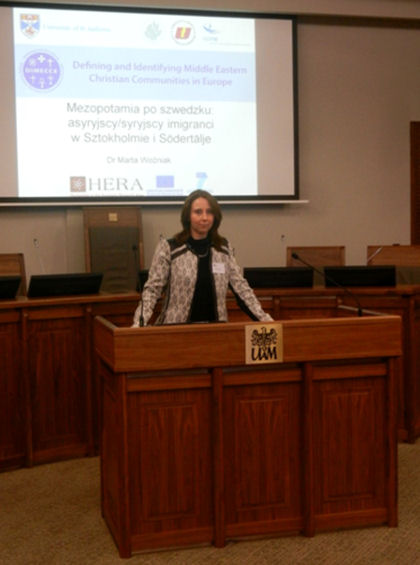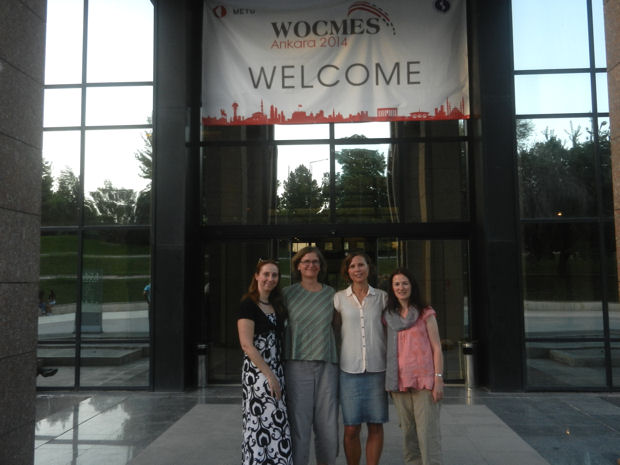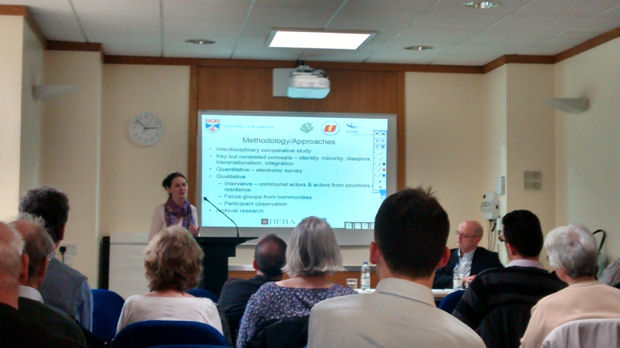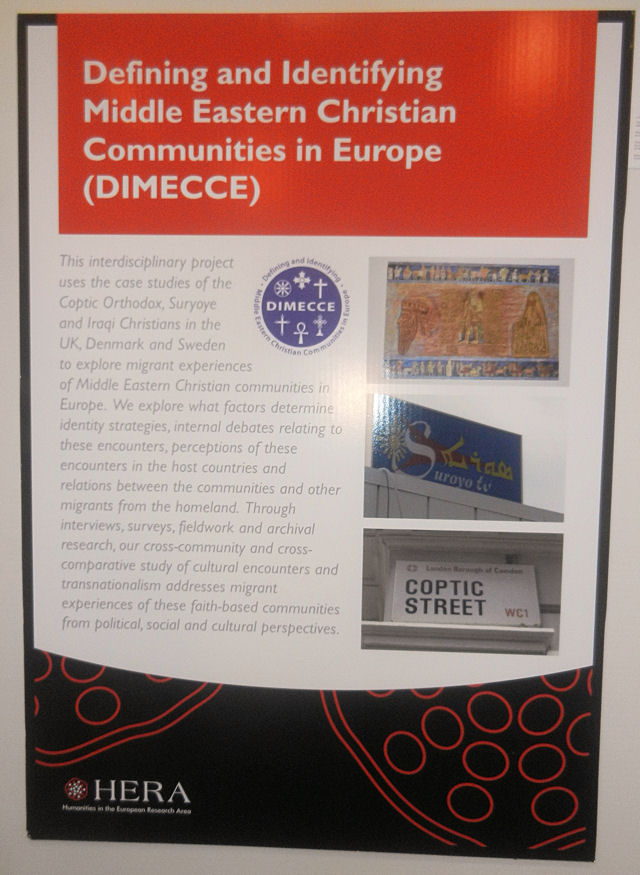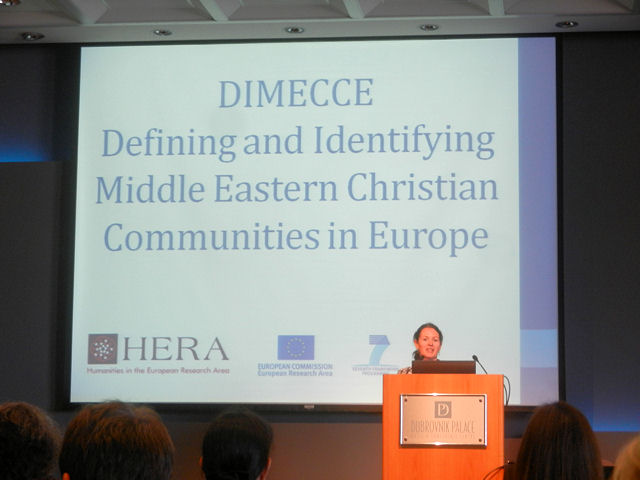DIMECCE paper presented at 11th Nordic Conference on Middle Eastern Studies, Helsinki, Finland
16th August 2019
Dr Fiona McCallum Guiney participated in the 11th Nordic Conference on Middle Eastern Studies organised by The Nordic Society for Middle Eastern Studies (NSM) and hosted by the Finnish Institute in the Middle East and the University of Helsinki on 14-th-16th August 2019. The conference theme was ‘Breaking and Creating Boundaries in the Middle East’. Dr McCallum Guiney was part of a panel on Diasporas Experiences and her paper was entitled ‘The Church is our home’: Middle Eastern Christian Diaspora Narratives on the ‘exclusive’ temporal space of spiritual buildings’. The conference included panels on Christianity in the Middle East and Assyrian identity.
DIMECCE PI awarded prestigious prize from the Polish Academy of Science
24th June 2019
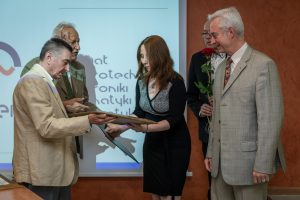
Dr Marta Wozniak-Bobinska was awarded a prize by the Polish Academy of Sciences for significant achievements which contribute to advancing the field of humanities and social sciences. During the award ceremony Dr Wozniak-Bobinska delivered a speech on her research entitled ‘Between the East and West: Not only Middle Eastern Christians’.
DIMECCE PI presents at the Polish Oriental Association and the Faculty of Oriental Studies, University of Warsaw
5th June 2019
Dr Marta Wozniak-Bobinska presented a paper on ‘Changing Roles of Assyrian/Aramean Men in the Family and Society: The Case of Sweden’ at a conference organised by the Polish Oriental Association and the Faculty of Oriental Studies, University of Warsaw, Poland, 5 June 2019.
DIMECCE PI book launch on Assyrians/Arameans in Sweden
15th May 2019
 Dr Marta Wozniak-Bobinska talked about her research in the framework of the DIMECCE project and her latest book ‘Modern Assyrian-Aramean Diaspora in Sweden’ (in Polish) at a book launch event in Lodz, Poland, on 15th May 2019. The launch event was part of a two day conference ‘The Middle East and the challenge of modernity’ organised by the Faculty of International and Political Studies, University of Lodz, Poland.
Dr Marta Wozniak-Bobinska talked about her research in the framework of the DIMECCE project and her latest book ‘Modern Assyrian-Aramean Diaspora in Sweden’ (in Polish) at a book launch event in Lodz, Poland, on 15th May 2019. The launch event was part of a two day conference ‘The Middle East and the challenge of modernity’ organised by the Faculty of International and Political Studies, University of Lodz, Poland.
DIMECCE paper at University of Warsaw
9th April 2019
DIMECCE PI Dr Marta Wozniak-Bobinska presented a paper on ’Assyrian-Aramean Diaspora in Sweden and Its Transnational Links’ at a conference organised by the Polish Oriental Association and the Faculty of Oriental Studies, University of Warsaw, Poland.
DIMECCE PI presents paper on Assyrians/Arameans in Sweden at Krakow University of Economics
6th March 2019
 Dr Marta Wozniak-Bobinska was invited to present a paper to the Department of European Studies at the Krakow University of Economics , Krakow, Poland on 6thMarch 2019. The paper was entitled ‘The Best in the Class? Assyrians/Arameans in Sweden: Integration and Transnationalism’ and using DIMECCE findings, discussed the integration of Assyrians/ Arameans in Sweden.
Dr Marta Wozniak-Bobinska was invited to present a paper to the Department of European Studies at the Krakow University of Economics , Krakow, Poland on 6thMarch 2019. The paper was entitled ‘The Best in the Class? Assyrians/Arameans in Sweden: Integration and Transnationalism’ and using DIMECCE findings, discussed the integration of Assyrians/ Arameans in Sweden.
DIMECCE PI appointed to Danish Advisory Board regarding Religious Communities
1st December 2018
In 2018 Lise Paulsen Galal was appointed member of “Det Rådgivende Udvalg vedr. Trossamfund” (The Advisory Board regarding Religious Communities) by the Minister for Ecclesiastical Affairs for a four year term. The Minister consults the board before a religious community or congregation is authorised (recognised) by the Danish State. In an article in the Christian Daily (Kristeligt Dagblad) about the appointments of new board members, Dr Galal’s knowledge on Middle Eastern Christians was highlighted.
DIMECCE PL in Norway
1st November 2018
Dr Fiona McCallum Guiney was invited to present at a joint seminar organised by the Nordic Institute for Mission Studies and Ecumenics and VID Specialized University in Stavanger. The seminar theme was ‘Quo Vadis? Christians and Christianity in the Middle East: Conflict, Migration and Future Challenges’. Speakers included academics, journalists and ecumenical actors. Dr McCallum Guiney’s paper was entitled ‘Christians in the Middle East and diaspora: identity, migration and interaction’ and provided an overview of the situation for Middle Eastern Christians in the region and diaspora. The audience consisted of scholars in religion and history and representatives from religious organisations both locally in Stavanger and also further afield in Norway and other parts of Scandinavia.
DIMECCE paper at the joint conference of BASR and ISASR, Belfast 2018
3rd-5thSeptember 2018
DIMECCE PL Dr Fiona McCallum attended the first joint conference of the British Association for the Study of Religions (BASR) and Irish Society for the Academic Study of Religions (ISASR) which was hosted by Queens University in Belfast, Northern Ireland. The conference theme was‘Borders and Boundaries: ‘Religion’ on the Periphery’. Dr McCallum presented a paper entitled ‘The Church is our home’: Middle Eastern Christian Diaspora Narratives on the ‘exclusive’ temporal space of spiritual buildings’. The paper focused on the role that a church building plays for faith-based migrant communities and how it affects interaction with wider society.
DIMECCE PL Australia tour
July 2018
Dr Fiona McCallum visited the Australian states of Victoria and New South Wales in July 2018. During her trip, she gave several talks on DIMECCE findings. The main event was participation in the ‘Copts in Modernity’ symposium organised by St Athanasius College in Melbourne on 13th-16thJuly. The conference brought together international scholars as well as Coptic clergy and community members from Egypt, Australia and other parts of the diaspora. Dr McCallum gave a talk on ‘Coptic Youth in the UK’ presenting findings on identity, activism and challenges facing the youth. The feedback from those working with diaspora communities elsewhere indicated that the findings had resonance beyond the UK context. Dr McCallum also gave a lecture at the Middle East Studies Forum, Deakin University in Melbourne where she provided an overview on Christians in the Middle East and the diaspora. In Sydney, Dr McCallum presented DIMECCE findings on societal and transnational interactions to an audience of academics, ecumenical actors and community members at Macquarie University.

Copts in Modernity conference, St Athanasius College, Melbourne,
L – Dr McCallum presenting; R: Group Photo of participants
DIMECCE project contributes to workshop exploring new directions for Middle Eastern Christian diaspora studies
21st-22ndJune 2018
Dr Fiona McCallum was invited to attend a workshop organised by Prof Heleen Murre van der Berg, Director of the Institute for Eastern Christianity at Radboud University, Nijmegen, the Netherlands. Scholars working on projects relating to Middle Eastern Christian diasporas were asked to present key findings and suggest further avenues for research. Prof Murre van der Berg is preparing a new project on ‘Orthodoxy in Transition’ which will look at these diasporas from the arts disciplines. Dr McCallum focused on language use and made suggestions relating to exploring the spread of texts in and between diasporas.
Findings presented at the University of Edinburgh’s Centre for the Study of World Christianity
17thOctober 2017
Dr Fiona McCallum was invited by colleagues at the Centre for the Study of World Christianity to present a paper on the DIMECCE project as part of the centre’s research seminar series. In October 2017, she gave an extended version of her previous paper on Middle Eastern Christian Diasporic Humanitarian and Political Activism in the UK. The seminar was co-sponsored by the Global Network for Christian-Muslim Studies.
DIMECCE participation at BRISMES 2017
5th-7thJuly 2017
The UK DIMECCE team members participated in another BRISMES (British Society for Middle Eastern Studies) conference – this time on their doorstep in Edinburgh. The conference theme was ‘Movement and Migration in the Middle East’ which was of direct relevance to the DIMECCE project. DIMECCE Postdoc Dr Alistair Hunter organised a panel on ‘Middle Eastern Christians in Diaspora: dialectics of integration’ with contributions from DIMECCE members and a friend of DIMECCE Daria Vorobyeva, PhD student at the University of St Andrews. Dr Hunter presented a paper entitled ‘Stick or twist? The tradition/innovation dilemma facing diasporic Middle Eastern churches in Europe’ which explored language use within churches. An earlier version of this paper was presented at the American Academy of Religion Annual meeting in Atlanta in 2015. Dr Fiona McCallum gave a paper on ‘Middle Eastern Christian Diasporic Humanitarian and Political Activism in the UK: Does the Allure of the Homeland still Resonate with the Diaspora Youth?’ sharing findings on youth activism towards the Middle Eastern homeland(s). An earlier version was given at the Middle Eastern Studies Association conference in Denver in 2015. The last paper in the panel was given by Daria Vorobyeva on the integration of Syrian Armenian migrants to the Republic of Armenia. The paper covers one theme of Daria’s PhD thesis on forced migration using the case study of Syrian Armenians in Lebanon and Armenia. Daria received her PhD from the School of International Relations at the University of St Andrews in 2018.
DIMECCE paper presented at ECPR Joint Sessions of Workshops
25th-30thApril 2017
Dr Fiona McCallum, DIMECCE Project Leader presented a paper entitled ‘Shared religion but still a marginalised Other: Middle Eastern Christian encounters with political secularism in the UK’ at the European Consortium of Political Research (ECPR) Joint Sessions. The Joint Sessions bring together political science scholars around the world who are accepted on to a workshop and attend and present at that workshop for the duration of the conference. The 2017 event was hosted by the University of Nottingham. Dr McCallum participated in a workshop on ‘Political secularism and religious difference in Europe, the Middle East and North Africa’. She presented findings relating to Middle Eastern Christians’ understandings and experiences of secularism in the UK context. Her paper has now been transformed into an article and published in the Journal of Church and State in 2018. This is the second DIMECCE paper to be presented at ECPR after Dr Marta Wozniak participated in the 2015 Joint Sessions in Warsaw in 2015.
DIMECCE PL contributes to BBC Radio 4 panel
5 December 2016
Dr Fiona McCallum was invited to participate on BBC Radio 4’s ‘Beyond Belief’ discussing programme on an episode exploring the impact of migration on the church in the UK. The conversation looked at the changing role of the church in the UK, how migration can be seen as reinvigorating mainstream churches but how this also presents challenges to churches and wider society. Dr McCallum spoke specifically on Middle Eastern Christian migrants. The programme can be listened to here.
Danish PI presents at workshop on the Assyrian/Syriac community in Sweden
5 December 2016
Danish PI Lise Paulsen Galal participated in a workshop held in Lund on the theme of ‘Integration processes within the Assyrian/Syriac community in Sweden’, where she gave a short presentation of the DIMECCE project, distributed the project information booklet and contributed with comments to a future Swedish research project.
DIMECCE participation in HERA Cultural Encounters End of Funding Call Conference
15-16 September 2016
The official end of the Cultural Encounters funded programme was marked by a closing conference organised by HERA and held in the impressive venue of Brevnov Benedictine Monastery in Prague on 15th-16th September 2016. All Cultural Encounters projects were asked to provide a poster presentation and visual display. The DIMECCE team selected their facts and figures map from the information booklet as well as maps displaying the transnational ties of the communities. Copies of the booklet were also available for people to take away with them. As well as showcasing the findings and activities of the Cultural Encounters projects, the event also served as the launch of the new funding call ‘Uses of the Past’. Members of the finished project teams were able to give both formal and informal advice to those setting out. DIMECCE PL Dr Fiona McCallum was asked to present on a panel entitled ‘Managing a Successful HERA Project’ and gave tips and answered questions based on the DIMECCE experience on how to achieve your research goals, fulfil HERA criteria, deal with challenges and still have fun. The Prague conference was a fitting end to the official completion of the project but the research and work still continues in other forms.
DIMECCE Project part of panel on Coptic diaspora at International Coptic Congress
25-29 July 2016
Dr Fiona McCallum travelled to Claremont, California to participate in the 11th International Congress of Coptic Studies, a multidisciplinary event bringing together scholars working on all things Coptic – archaeology, art, ancient literature, linguistics, theology, history and more contemporary aspects as well as members of the Coptic community. Given the location of the conference venue within one of the thriving diaspora dioceses, it was fitting that there was a double panel dedicated to this topic. Dr Saad Michael Saad and Dr Donald Westbrook organised a panel entitled ‘The Coptic Diaspora: International and Interdisciplinary Perspectives’. The papers provided a wealth of information and covered important issues relating to identity, heritage, language, gender, generation and music. The diaspora element was also notable in that the papers focused on different regions with some discussing North America and others on Europe. Dr McCallum’s paper entitled ‘Service Provider and Maintainer of Cultural Identity: The Coptic Orthodox Church in the UK as a Religious Diaspora Actor’ emphasised the role that the Coptic Orthodox Church in the UK plays as the primary communal institution and how this allows it to seek to provide not just spiritual services but also to meet practical and identity needs of the community. The paper also explored the challenges and difficulties faced by the institution in doing so particularly in catering for the needs of different sections of the community especially the youth using the examples of language and activism in wider society. The attendance of prominent Coptic Orthodox clergy and members of the diaspora (1st and 2nd generation) in the audience indicated the significance given to the issues of the diaspora and was also an opportunity to share further findings of the DIMECCE project. Other panels on Coptic Orthodox church leadership in recent times and the church in the contemporary period also resulted in interesting papers and discussion. The congress proved an interesting forum to contrast the European especially British context with the North American one through listening to papers, discussing research projects with 2nd generation scholars, speaking with members of the North American diaspora and a visit to a nearby Coptic Orthodox church, St John’s, Covina for the conference dinner.
DIMECCE represented at European Commission workshop
8 April 2016
The European Commission organised a workshop to learn about ongoing research funded by the EU on Cultures and Citizenship. The aim was to gain insight into research findings in order to include these in policy discussions and plans for future research funding calls. Academics co-ordinating projects relating to culture and citizenship presented their work. DIMECCE was the only project from the HERA Cultural Encounters call and also the only project which was officially finished, if only recently. PL Dr Fiona McCallum introduced the project and HERA and then covered a few relevant themes related to the workshop topic including the role of communal institutions in maintaining cultural heritage, attitudes towards acquiring citizenship, state and societal awareness, misrecognition and activism. The project attracted attention and questions from the different European Commission representatives given its relevance to current policy issues including integration and the European refugee crisis. The workshop was organised by the Directorate-General for Research and Innovation, European Commission and held in Brussels on 8 April 2016.
DIMECCE Members present at SeSaMO conference
17 – 19 March 2016
DIMECCE PL Dr Fiona McCallum and PI Dr Lise Paulsen Galal were part of a panel on ‘The Arab Spring and the Arab Christian diaspora in Europe’ at the 2016 Italian Middle Eastern Studies (SeSaMO) conference held in Catania, Sicily 17 – 19 March, 2016. The panel was organised by Dr Alessia Melcangi and Dr Georges Fahmi who put together an interesting panel exploring issues relevant to the impact of the Arab Uprisings on Middle Eastern Christians in the region and the diaspora. Dr Fahmi looked at the case studies of Egypt and Syria to discuss why Arab Christians tend not to revolt and stressed the importance of not approaching the communities as monolithic. This presentation was followed by two scholars familiar to the DIMECCE project. Dr Donald Westbrook discussed the role of electronic diasporas within the Coptic community and Dr Andreas Schmoller examined the notion of translocated sectarianism amongst Syriac Christians in Austria. Dr McCallum delivered a paper entitled ‘Family, Cultural, Emotional and Political Ties: Narratives of Middle Eastern Christian Migrants in UK on the Homeland’ which categorised the different type of ties Middle Eastern Christians in the UK have to their Middle Eastern country of origin, arguing that family and emotional ties tend to be the strongest ones. Dr Galal’s paper entitled ‘Negotiations of believing and belonging among Iraqi and Egyptian Christians in Denmark’ explored negotiations of belonging of Iraqi and Egyptian Christians in Denmark. The panel was well attended by participants at the conference.
DIMECCE PL participates in Rome conference on Middle Eastern Christians
23 – 26 February 2016
DIMECCE PL Dr Fiona McCallum was invited to participate in a conference entitled ‘Between World Society and Regional Transformations: Christians, Christian Churches and Religion in a Changing Middle East’ – download conference flyer (PDF). The conference was organised by Prof. Stephan Stetter, University of the Bundeswehr Munich, on behalf of the German Bishops Conference Research Group on International Church Affairs and held in Rome. The conference brought together leading church representatives from the Middle East as well as academics both from the region and outside working on relevant issues to discuss crucial issues such as the impact of recent events on Middle Eastern Christians and relations between the different Middle Eastern Christian communities as well as other faiths, especially Islam.
Dr McCallum co-chaired a workshop on inclusion and exclusion in everyday life with H.E. Archbishop Shahan Sarkissian, the Armenian Orthodox Bishop of Aleppo. Other workshops looked at church-state relations as well as country specific ones. There were also keynote speakers in panels including H.B. Patriarch Bechara Boutros al-Rai, Patriarch of Antioch and Head of the Maronite Church; H.E. Metropolitan Ignatius Alhoshi, Orthodox Church of Antioch, Diocese in Western and Southern Europe; H.G. Bishop Pavly, Coptic Orthodox General Bishop; H.E. Archbishop Nikodimos Daoud Sharaf, Syrian Orthodox Church, Mosul and Kurdistan; H.E. Cardinal Leonardo Sandri, Prefect of the Congregation for the Oriental Churches, Rome; H.E. Mgr. William Shomali, Aux. Bishop of the Latin Patriarch of Jerusalem; H.E. Bishop Paul Hinder, Apostolic Vicariate of Southern Arabia, United Arab Emirates; H.E. Bishop Antonios Aziz Mina, Coptic Catholic Church, Guizeh; Professor Mahmoud Ayoub, Hartford Seminary and Professor Georges Tamer, University of Erlangen-Nuremberg.
The audience made for a lively discussion and Dr McCallum had an opportunity to disseminate DIMECCE findings to those interested in the project. Dr McCallum is also involved in a book project connected to the conference and will be contributing a book chapter to a forthcoming volume edited by Prof. Stetter.
DIMECCE Team participate in Middle Eastern Christians and Europe workshop in Salzburg
18 – 19 February 2016
Members of all three country teams of DIMECCE participated in a workshop organised by a friend and colleague of the DIMECCE project Dr Andreas Schmoller of the Centre for the Study of Eastern Christianity (ZECO) at the University of Salzburg, 18 -19 February 2016. The workshop was entitled ‘Middle Eastern Christians and Europe: Diasporas-Relations-Entangled Histories’ and aimed to explore both the historical and contemporary relationship between Middle Eastern Christians and Europe. Dr Schmoller put together a fascinating programme which brought experts from different disciplines working on various Middle Eastern Christian denominations and focusing on interactions both in the Middle East and Europe.
The DIMECCE team contributed to two sessions. In the panel on the complexity of diaspora identities, Dr Sara Lei Sparre and Dr Lise Paulsen Galal presented a paper entitled ‘“We’re not all the same” – Experiences of in/visibility and im/mobility among Christians of Iraqi origin in Denmark’ which was followed by Dr Fiona McCallum who delivered a paper on ‘Narratives of Identity, Home and Belonging of Middle Eastern Christians in the UK’. Dr Marta Wozniak was part of the panel on diaspora churches where she presented her paper entitled ‘The role of the Syriac Orthodox Church and religion in Assyrian/Syriac life in Sweden’.
The workshop was an extremely useful event for the DIMECCE team to attend as it provided an opportunity to learn about research being conducted on similar topics as well as meeting new and old colleagues and all in the beautiful surroundings of picturesque Salzburg.
DIMECCE Danish team interviewed in relation to project theme
5 January 2016
Danish PI Dr Lise Paulsen Galal was interviewed by the Danish Broadcasting Corporation for an article on women’s role in faith communities published on 02.12.2015 and for the radio programme ‘Orientering’ on radio channel P1 (Danish Broadcasting Corporation) on 05.01.16, on sectarian conflicts translocating from the Middle East to Europe, with a focus on the situation of Middle Eastern Christians.
Launch events in UK
Three events were organised by Dr Fiona McCallum, DIMECCE Principal Investigator for the UK component of the project to inform interested people about the research findings and distribute copies of our publication ‘Middle Eastern Christians in Europe: Histories, Cultures and Communities’. While the main audience was the communities we have been working with for this project, others interested in the topic such as political, ecumenical and other civil society actors were also invited. Each powerpoint presentation consisted of an overview of the DIMECCE project, the migration context, internal dynamics of the communities, interactions with British society and transnational ties using data from the research.
The first UK event was held at St Mark’s Coptic Orthodox Church in London on 18th October 2015 when Dr McCallum was invited to be a guest presenter at one of St Mark’s Sunday meeting groups aimed at graduates. The presentation was publicised to other members of the church and an audience of around 40 heard Dr McCallum discuss the project findings. There was a positive response to the project being conducted with several suggestions for future research and queries as to how to progress further in terms of dealing with the lack of awareness of Middle Eastern Christians which is prevalent at all levels of British society which had been identified as a main theme in the research.
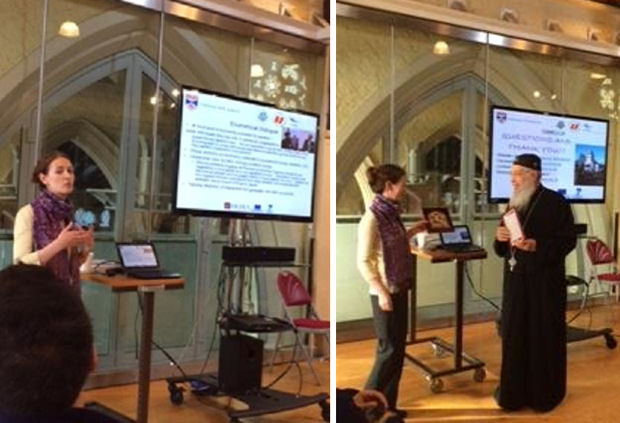
Photo 1: Dr McCallum presenting at the St Mark’s event in London
Photo 2: Dr McCallum receiving a gift in recognition of the research being conducted by the DIMECCE team
The second event on 1st November 2015 was primarily aimed at the Iraqi Christian and Assyrian communities and was kindly hosted by the Chaldean community and held in the church hall of the church they use for Sunday worship – Holy Family Church in Acton, London. An audience of around 40, primarily Chaldeans but also some Assyrians and a few members of the media, enjoyed some delicious food prepared by some church members before the event began. The event was chaired by Dr Suha Rassam, the author of Christianity in Iraq and a founder of the UK-based charity Iraqi Christians in Need. The project findings sparked a lot of interest from the audience with many questions ranging from comparisons with other communities, the situation in the Middle East itself and the current refugee crisis and again the issue of how to spread knowledge of the project findings and the communities more generally to political actors in the UK.
The third and final event on 6th December in Kirkcaldy in Scotland proved a logistical challenge as the east of Scotland was not only being battered by Storm Desmond – quite expected in winter, but also having to deal with the closure of the Forth Road Bridge – completely unexpected! This highlighted one of the issues which had come up in the research which is that many of the communities are geographically spread and travelling to church can sometimes be difficult. Numbers were down slightly at St Mark’s Coptic Orthodox Church in Kirkcaldy but there was still a good turnout for the DIMECCE event after the service which was held instead of the usual adult Sunday meetings. Members of the local Kirkcaldy clergy, local government officials and civil society activists also attended. The discussion after the presentation focused on the comparative aspect of the study, the again recurring theme of disseminating the research findings and the current situation in the Middle East.
Overall, the events proved extremely worthwhile not only in reconnecting with the communities we were researching and informing them of the findings of the project both through the presentation and the publication but also through gaining valuable feedback and excellent ideas for future research! As with all parts of the project, the events would not have been possible without the assistance of the communities, in particular, the priests and specific individuals who helped arrange the events – many thanks again.
DIMECCE papers presented at University of Copenhagen
26 November 2015
The Danish DIMECCE team was invited to present DIMECCE findings from the Danish fieldwork at a public seminar on Middle Eastern Christians in Denmark held at the University of Copenhagen. Dr Sara Lei Sparre, post doc, and Dr Lise Paulsen Galal, Principal Investigator, gave a talk on the ambivalent feelings of being the same but different as Iraqi Christians in Denmark. DIMECCE Research Assistant Anne Rosenlund Jørgensen, who has recently completed her Masters studies, spoke about ‘Middle Eastern Christians’ Narratives on Intimacy with Muslims’. The presentations were received well and with interest. The seminar was organised by the Forum for Islam Research.
DIMECCE Postdoc presents research at AAR annual meeting, Atlanta
21 – 24 November 2015
At the end of November 2015 Dr Alistair Hunter, the postdoctoral researcher for the UK team, travelled stateside to attend the annual meeting of the American Academy of Religion (AAR) in Atlanta, Georgia. The AAR annual meeting is a huge event in the religious studies calendar with around 10,000 people from all over the world attending the four day long event. Dr Hunter’s presentation was one of four papers scheduled for a panel about ‘Modern Arab Christianity and the Complexity of Identity’. The panel was convened by the Middle Eastern Christianity Group, which is led by Michel Andraos (Catholic Theological Union) and Jazon Zaborowski (Religious Studies, Bradley University).
Dr Hunter’s paper was entitled ‘Stick or Twist? The tradition/innovation dilemma facing diasporic Middle Eastern Churches in competitive religious marketplaces’. The paper discussed the key question of which language(s) to use in church services. From one side, Middle Eastern churches in Europe are under pressure to maintain a unique identity based on traditional language practices. From the other side, there is pressure to conduct services solely or partly in the host country language, in order to be relevant to younger generations and to attract new members. In analyzing this dilemma, Dr Hunter argued that the relationship between different generations is crucial, as is the willingness of church members to engage in evangelism. The presentation was positively received: the questions and comments centred on Middle Eastern Churches’ evangelism in diaspora, ecumenical relations and language adaptation in other immigrant churches in earlier time periods. Overall the AAR conference was a very useful way of bringing the DIMECCE project to the attention of colleagues in North America and elsewhere.
DIMECCE paper presented at MESA conference, Denver
21 – 24 November 2015
Dr Fiona McCallum, Principal Investigator for the UK team presented a paper focusing on the UK project at the annual conference of the Middle East Studies Association held in Denver, Colorado, 21-24 November 2015. The MESA meeting is one of the highlights on the conference circuit for scholars working in the field of Middle Eastern studies and the Denver conference was attended by over 1700 people. Dr McCallum participated on an interdisciplinary panel entitled ‘Diaspora, Migration and Identity’ where the papers approached migration from various perspectives, including literary figures as diasporic actors and anthropological studies of Middle Eastern migrant communities in North America and Europe. Her paper was entitled ‘Homeland Ties, Community Cohesion and Youth Disengagement? Middle Eastern Christian Diasporic Humanitarian and Political Activism in the UK’ and added to the panel discussion by examining the role of various diasporic organisations which focus their activities on the Middle East. The paper explored how these activities can reinforce communal identity but can also struggle to engage with younger generations in the UK.
DIMECCE paper presented at AAA conference
18 – 22 November 2015
Dr Lise Paulsen Galal, principal investigator on the DIMECCE Danish team, attended the 114th American Anthropological Association Annual Meeting to present a paper entitled ‘What it means to be Christian: Sensing the familiar’. Drawing on data from fieldwork in Denmark, she raised questions about the importance of the church as a ritual space for Middle Eastern Christians in Denmark. In particular, she explored how ritual space is created as familiar to the congregation through sensorial practices and materiality. The conference was held in Denver, Colorado.
DIMECCE project presented at Oxford talks
In September 2015, DIMECCE Project Leader Dr Fiona McCallum travelled to Oxford to present two talks on the DIMECCE project. The first was as part of a study day on Middle Eastern Christianity organized by the University of Oxford’s Department of Continuing Education. Dr McCallum joined experts on the Armenian Church, Christianity in Iraq and Palestinian Christians to provide an overview of Middle Eastern Christianity today to an audience of interested members of the public.
The second talk was a seminar organized by the Oxford Journal of Law and Religion. Dr McCallum presented selected findings of the UK case study focusing particularly on the issue of church and communal languages and identity, conversion, relations between the church hierarchies in the Middle East and the communities in the UK and experiences of citizenship in the UK.
Launch events in Denmark
20 – 22 August 2015
The Danish component of the DIMECCE research project held two launch events at the end of the summer; one in Copenhagen on 20th August and one in Aarhus on 22nd August. Besides being an opportunity to present relevant research results on Middle Eastern Christians in Denmark, the UK and Sweden, it was also a great opportunity to gather interested parties in the project and allow them to respond to the findings of the DIMECCE research, particularly those presented in the publication ‘ Middle Eastern Christians in Europe: Histories, Cultures and Communities’.
The launch in Copenhagen was held in Fredens Kirke in cooperation with the Tværkulturelt Center (The Intercultural Christian Centre); a resource centre for churches in Denmark working with integration and immigration. The launch was a great success with around 70 attendees from various Danish ecumenical organisations, several priests from Danish Lutheran churches, scholars interested in the field and other organisational representatives. Moreover, both the Coptic Orthodox Church and Chaldean Catholic church was represented by active members.
The Danish research component were the first speakers. Associate Professor Lise Paulsen Galal gave an overall presentation of the project, Postdoc Sara Lei Sparre presented the research results regarding the younger generations of Middle Eastern Christians in Denmark and finally, Research Assistant Anne Rosenlund Jørgensen presented her MA thesis on Middle Eastern Christians in Denmark practicing religiosity outside the Middle Eastern Orthodox or Catholic churches. Afterwards, Birthe Munck-Fairwood, head of the Tværkulturelt Center, Adnan Dahan, chairman of the board of the Tværkulturelt Center, Micheal Bestawrous, co-founder of the Coptic Orthodox Church in Copenhagen, and Mirna, an active member of the youth group in the Chaldean Catholic Church, gave their responses to the research findings presented in the booklet.
After eating a delightful Middle Eastern dinner, prepared by an Iraqi couple associated with the Tværkulturelt Center, we ended the launch with an active Q&A session.
The launch in Aarhus two days later was held in the premises of the Catholic Church. It was a great success, in spite of being a more intimate event with about 30 attendees. However, all the Middle Eastern Churches in Aarhus were represented as well as ecumenical actors and scholars. The Danish component presented the same findings as in Copenhagen followed by an inspiring presentation and response to the findings in the booklet by Associate Professor Peter Lodberg from the School of Culture and Society – Systematic Theology at Aarhus University. Finally, representatives from all the Middle Eastern Churches in Aarhus gave their response to the findings in the booklet. They were: Osama Rana, youth leader in the Chaldean Catholic Church, Yakob Ohara, active member in both the Assyrian Church of the East and the Ancient Church of the East, and Romel Shaol Yokhena, priest of the Fountain of Life Ministries. Other community members also contributed with comments.
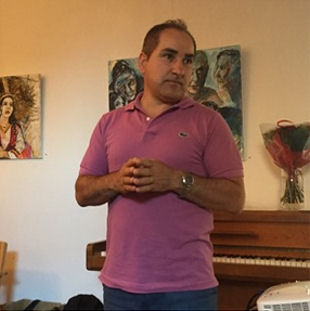
Osama Rana, youth leader in the Chaldean Catholic Church in Aarhus, giving his response to the booklet findings
Both launches were very rewarding to the Danish component of the DIMECCE project. We are very thankful that most of the Middle Eastern Churches in Denmark participating in the DIMECCE research project were represented and gave their response to the publication. We are also very thankful that so many organisations and churches showed their interest in the research project by attending these events.
DIMECCE Danish team interviewed about project findings for Danish Dailies
In August 2015, before the booklet launches and presentation of project findings in Denmark, postdoc Sara Lei Sparre was interviewed for articles in the Christian Daily and the online newspaper Sameksistens.dk. The article in the Christian Daily, Mellemøstlige Kristne i Danmark mobiliserer sig politisk concerns the political mobilisation of Middle Eastern Christians in the UK, Denmark and Sweden in the wake of the attacks of Islamic State in Iraq and Syria.
The article for Sameksistens.dk, Mellemøstlige Kristne i Europa satser på de unge focuses specifically on the role of the young generations among Middle Eastern Christian in the three countries, and how priests and parents invest in activities and mission in order to keep the youth in the churches and strengthen their identification with and belonging to the Christians faith and the languages and traditions of their countries of origin.
Launch events in Sweden
9 – 10 July 2015
Two launch events to promote the DIMECCE booklet ‘Middle Eastern Christians in Europe: Histories, Cultures and Communities’ and present the project findings were held in Sweden in July 2015.
The venue for the first event held on 9th July was Södertälje library. The event was attended by stakeholders, including the Mayor of Södertälje, a representative of the Church of Sweden, Assyrian and Syriac politicians, scholars working on Middle Eastern Christians and community members. Dr Marta Wozniak gave a one hour lecture in English which provided an overview of the project, the results of the electronic survey relating to Sweden as well as findings from the qualitative fieldwork. The lecture was illustrated with more than 80 powerpoint slides. There was time for questions and discussion, particularly about differences among Assyrian/Syriac communities living in the three case study countries – Sweden, UK and Denmark. The booklets were distributed to all participants and the event was deemed to be a success by all who attended.
The second event took place the next day, 10th July, in the Assyrian Cultural Center in Botkyrka. At this event, Dr Wozniak’s talk was consecutively interpreted into Swedish by the DIMECCE Research Assistant Danielle Barsoum Malki – the listeners were Assyrian activists and an ecumenical representative, Hakan Sandvik. The Swedish language version of the booklet proved rather helpful in this context. The audience was interested in future publications planned by the DIMECCE team and were also pleased to find out that they could download a PDF version of the booklet from the DIMECCE project website. Dr Wozniak and Danielle Barsoum Malki were congratulated on their efforts and encouraged to continue research on these topics.
Information event held at CCME, Brussels
Wednesday 1 July 2015
On 1st July 2015, the DIMECCE team visited Brussels to present selected findings of the project to an audience of civil society actors hosted by the project’s non-academic partner The Churches’ Commission for Migrants in Europe. Due to the work of Doris Petschze and Torsten Moritz and the rest of the CCME team, over 25 people attended the event, received a copy of the multilingual publication ‘Middle Eastern Christians in Europe: Histories, Cultures and Communities’ as well as a handout of key recommendations, and heard the research team discuss their findings.
Dr Marta Wozniak started the event by providing an overview of the project, objectives and progress. Dr Sara Lei Sparre and Dr Lise Paulsen Galal discussed the transnational connections and multiple belongings of Middle Eastern Christians distinguishing between individual transnational connections and practices, such as family relations, churches as transnational – or global – institutions, and other organisations and associations established to support politically, socially or culturally connections and development in the country or region of origin.Dr Fiona McCallum then looked at interactions within borders by first exploring ecumenical relations at the local level, national level and between Middle Eastern Christians then turning to state and public engagement highlighting issues relating to awareness of the communities, misrecognition and views on religiosity before examining attitudes towards citizenship in the three case study countries. The Q&A session resulted in questions inviting comparisons with other communities as well as within the case study communities and requests for the presentation slides.
As the first of the events launching the multilingual publication, the event was deemed a success by the organisers and attendees. Dr McCallum and Dr Wozniak were also able to visit the European Parliament later the same day and have an informal meeting on the project findings with Catherine Stihler MEP.
DIMECCE-organised panel at BRISMES, London
24 – 26 June 2015
On 24th – 26th July, the DIMECCE team arrived in London to attend the annual conference of the British Society for Middle Eastern Studies which was hosted by the LSE Middle East Centre in the heart of London. This year’s theme was ‘Liberation’ and joined by Andreas Schmoller (University of Salzburg) and Heidi Armbruster (University of Southampton), the DIMECCE team organised a panel entitled ‘Middle Eastern Christian Migrant Experiences of ‘Liberation’ and its Challenges in Europe’. Each panellist applied the term ‘liberation’ in relation to their own research.
The panel commenced with Heidi Armbruster who discussed the role that language plays in liberation using the example of Syriac Christians in the German-speaking context, who view their flight from Turkey as liberation from a minority experience but also resulting in a loss of their culture and tradition and therefore see language as a means to maintain their own culture. The second paper by Andreas Schmoller presented different narratives of Syriac Orthodox refugees who have recently settled in Syria. He indicated different perspectives but showed that they are united in their view that there is no return to Syria.
In the first of the DIMECCE papers, Marta Wozniak discussed the different narratives of return present amongst Assyrians and Arameans in the Swedish diaspora. While acknowledging that these are held by a minority of members of these communities, she identified three main views – safe haven in Northern Iraq, autonomy for Arameans and Maronites in a ‘Christian homeland’ in Syria and Lebanon, and autonomy jointly with Kurds and Sunni Muslims in northern Syria.In the next paper, Lise Paulsen Galal and Sara Lei Sparre explored refugee stories of Christians of Iraqi origins in Denmark focusing on how these navigate concepts of liberation, freedom, marginalisation and political oppression. In the final paper, Fiona McCallum explored Middle Eastern Christians’ perspectives on religiosity in the UK and presented different views on the notion of the UK being a Christian country and how this is perceived to affect their communities notably through the idea of a clash of values and the impact on the youth.
The panellists received numerous questions from the audience, particularly on the comparative aspect, and the conference also provided an opportunity to meet with scholars working on similar areas, as well as to renew acquaintances with those linked to DIMECCE.

Panel at BRISMES.
From left to right: Andreas Schmoller, Marta Wozniak, Sara Lei Sparre, Lise Paulsen Galal, Heidi Armbruster, Fiona McCallum
DIMECCE paper presented at ‘Ways to Religion’ conference in Wroclaw
6 – 7 June 2015
Dr Marta Wozniak presented a paper entitled ‘Religiosity, Values, and Religious Identity of Assyrians/Syriacs in Sweden’ at the international conference ‘Ways to Religion’ in Wroclaw, Poland. The conference was organised by the Polish Academy of Sciences and Department of Contact Linguistics and Discourse Anthropology, Philological School of Higher Education in Wroclaw. Using data material from the DIMECCE fieldwork in Sweden and her previous quantitative research on Assyrians/Syriacs worldwide, Dr Wozniak presented on Assyrian/Syriac religious and ethnic identities, the changing and declining religious practices among this group, the role of parents and the church community in affecting religious identity and practice, as well as the community’s perception of religiosity in Sweden and Middle Eastern Christian values vs Swedish values. The conference’s aim was to bring together researchers representing a broad variety of areas dealing with various aspects of language contacts, cultural, and historical space and the development of communication in a variety of verbal and non-verbal religious discourses.
DIMECCE participation in PSA annual conference, Sheffield
Wednesday 1 April 2015
Dr Fiona McCallum, Principal Investigator in the UK partner of the DIMECCE project was part of a panel focusing on migration studies during the 65th annual Political Studies Association conference which was held in Sheffield, UK, 30th March – 1st April 2015. In her paper entitled ‘Migrant Narratives of ‘Britishness’: Middle Eastern Christians in the UK’, Dr McCallum used interview material collected from the UK fieldwork to highlight different understandings of ‘Britishness’ as conveyed by Middle Eastern Christian interviewees. These included references to civic values and citizenship as well as notions of the UK as ‘home’. The panel attracted scholars working on migration issues and demonstrated the similarities and differences of the Middle Eastern Christian case study in comparison to other migrant groups both in the UK and other European societies.
DIMECCE paper presented at ECPR Joint Sessions of Workshops
29 March – 2 April 2015
Dr Marta Wozniak, the DIMECCE Principal Investigator based at the University of Lodz, presented a paper entitled ‘From religious to ethno-religious: Identity change among Assyrians/Syriacs in Sweden’ at the Joint Sessions of Workshops organised by the European Consortium for Political Research (ECPR). The Joint Sessions is a prestigious event and has been held in a different European city each spring since 1973 – this year it was the turn of Warsaw in Poland, with the University of Warsaw providing the venue. Due to the workshop format, the ECPR events are a leading forum for substantive discussion and collaboration between political science scholars from across the world, and at all stages of their career. Each workshop has 15-20 participants who are selected to contribute to that particular workshop, present their paper and exclusively attend the workshop for the full five days. Dr Wozniak participated in a workshop on ‘Comparative Approaches to Identity Change: Macro, Meso and Micro Perspectives’. Using data material from DIMECCE fieldwork conducted in Sweden, Dr Wozniak discussed the role of religious and secular elites in identity change among Assyrians/Syriacs in Sweden. This case study approach complemented the workshop discussion and was well-received by the workshop participants.
DIMECCE UK project discussed at College of William and Mary, Virginia
Wednesday 25 March 2015
DIMECCE UK Principal Investigator Dr Fiona McCallum visited the College of William and Mary in Williamsburg, Virginia along with several colleagues from the University of St Andrews to participate in the 2nd joint College of William and Mary and University of St Andrews symposium which seeks to enhance further exchange between the two institutions. This interdisciplinary symposium based on the broad theme of ‘Crossing Boundaries’ attracted papers amongst others on literature, nationalism, migration, colonization and its legacies. In her paper entitled ‘Multiple Contested Belonging of Home, Residence and Transnational: Narratives of Middle Eastern Christians in the UK’, Dr McCallum presented perspectives from the UK fieldwork on these different concepts and examined how they both intertwine and compete.
DIMECCE Principal Investigator invited speaker at the University of Oxford
Tuesday 24 February 2015
Dr Fiona McCallum, the Principal Investigator for the UK team was invited to give a presentation on the DIMECCE project on 24th February as part of the seminar series on religious freedom organised by the Centre for Christianity and Culture, Regents Park College, University of Oxford. In her paper entitled, ‘Middle Eastern Christians in the UK: Narratives on Identity, Integration and Transnational Ties’, she provided an overview of the project objectives and methodology and then discusses selected findings including the role of the communal churches, debates concerning language use in the church and community, inter-generational issues, community reactions to state and public awareness of them, views on citizenship, narratives on homeland and engagement with the Middle Eastern country of origin. The presentation and research received an enthusiastic response from the mainly theology scholars attending who were interested in hearing the similarities between the DIMECCE case study communities and other faith-based groups they were more familiar with.
DIMECCE paper presented at Transnational Migration conference in Malmö
29 – 30 January 2015
Dr Lise Paulsen Galal presented a co-authored Danish team paper entitled ‘From Community and Minority to Transnational Studies: The Example of Middle Eastern Christians in Europe’ at the international conference Transnational Migration: Disciplinary impacts. The conference was organised as part of a GPS (Global Political Studies) research day in collaboration with the Migration, Urbanisation and Societal Change (MUSA) PhD programme, Malmö University, and the Centre for Advanced Migrations Studies (AMIS), University of Copenhagen. In the paper, the question of community belonging and minority position was addressed as factors influencing Middle Eastern Christians’ transnational practices. Using data material from the DIMECCE fieldwork in Denmark and relating this to the UK and Swedish case studies, Dr Galal analysed how the organisational development and changes of a community influences its transnational practices. The conference brought together experts primarily from Europe who contributed theoretically and empirically to the broad topic of transnational migration.
DIMECCE paper presented at University of Edinburgh
Tuesday 18 November, 2014
On 18th November 2014, Dr Alistair Hunter, post-doctoral research fellow for the UK team, presented a paper about the DIMECCE research project to the University of Edinburgh’s Migration and Citizenship Research Group. Dr Hunter’s talk was entitled ‘You get misrecognised in the West and very recognised in the East’: Middle Eastern Christians in the UK and Islamophobia. The paper – co-authored with the DIMECCE project leader Dr Fiona McCallum – was a revised version of the paper originally given by Dr McCallum in Salzburg in October. The central premise of the paper is that Middle Eastern Christians can be simultaneously agents and victims of Islamophobia. Using material from interviews conducted as part of the UK fieldwork, Dr Hunter presented examples of Islamophobic discourse from Middle Eastern Christians, experiences of misrecognition as Muslims and examples of being subject to misplaced Islamophobic abuse. The paper was well-received and elicited several interesting questions and comments.
DIMECCE Principal Investigator invited presenter at EHESS in Paris
Wednesday 12 November, 2014
On 12th November 2014, the Principal Investigator for the UK project Dr Fiona McCallum was a guest presenter at the seminar series on Middle Eastern Christianity chaired by the notable scholar Professor Bernard Heyberger at the Institut d’études de l’Islam et des sociétés du monde musulman (ISIMM), Ecole des hautes études en sciences sociales (EHESS) in Paris. Dr McCallum’s paper was entitled ‘Identity and Interaction in the Lands of Immigration: Middle Eastern Christians in the UK’. Dr McCallum initially provided an introduction to the DIMECCE project including the objectives, comparative case studies, methodology and research questions. She then explored the UK case study in more detail and provided selected research findings including the significance of denominational churches in meeting spiritual and practical needs of their community, debates around language use and the role of the youth, British state and public awareness of Middle Eastern Christian communities in the UK, experiences of misrecognition and their impact, and views on ‘homeland’ and engagement with countries of origin. The audience of academics and students engaged with the paper and it was hoped by all present that similar research would soon be undertaken in France.
DIMECCE paper presented at the 9th Polish Arabists’ Conference in Poznan Tuesday 14 October 2014
On 14th October 2014, DIMECCE Principal Investigator Dr Marta Wozniak gave a presentation entitled ‘Swedish Mesopotamia: Assyrian/Syriac immigrants in Stockholm and Södertälje’ at the 9th Polish Arabists’ Conference. The two day conference was held at Adam Mickiewicz University in Poznan and gathered more than 60 scholars both from Poland and abroad. Dr Wozniak’s paper addressed several issues relating to Assyrians/Syriacs living in Sweden including their national, ethnic and religious identity, language use, involvement in communal and political activities, relations with family residing in the Middle East and attitudes both to Sweden and to the country of origin. Based on 200 electronic survey responses and 30 semi-structured interviews, Dr Wozniak argued that her findings show that the majority of Assyrians/Syriacs hold a positive view of Sweden, although they are afraid of the potential outbreak of xenophobic violence due to significant arrivals of new refugees escaping violence in Syria and Iraq.
DIMECCE UK team present paper at international Islamophobia conference
9 – 10 October 2014
Dr Fiona McCallum presented a co-authored UK team paper entitled ‘Translocation of Prejudice: Middle Eastern Christian Islamophobic Discourse in the UK’ at an international Islamophobia conference co-sponsored by the Department of Political Science, University of Salzburg, Islamophobia Documentation and Research Project at University of California Berkeley and the Muslim Teachers Training College, Vienna. The central argument of the paper is that Middle Eastern Christians can be simultaneously agents and victims of Islamophobia. Using material from interviews conducted as part of the UK fieldwork, Dr McCallum presented examples of Islamophobic discourse from Middle Eastern Christians, experiences of misrecognition as Muslims and examples of being subject to misplaced Islamophobic abuse. The conference brought together experts from Europe and further afield.
DIMECCE paper presented at IMISCOE conference
27 – 29 August 2014
Dr Alistair Hunter, the postdoc on the DIMECCE UK team, attended the 11th annual IMISCOE conference to present a paper focusing on one particular aspect of the research project – burial preferences of the interviewees. In his paper entitled ‘The significance of religious ritual, family and territorial attachment in decisions about preferred burial location: narratives of Middle Eastern Christians in Britain’, Dr Hunter presented data on preferred burial location and particularly focused on religious rationales regarding burial location. The conference was held at the Universidad Pontificia Comillas in Madrid.
DIMECCE panel at WOCMES
Wednesday 20 August 2014
The DIMECCE team participated in one of the panels organized by the Christians in the Middle East Research Network at the Fourth World Congress of Middle Eastern Studies (WOCMES-4) held at Middle East Technical University (METU) in Ankara, Turkey, 18th-22nd August 2014. The DIMECCE panel on 20th August was entitled ‘Displacement and Migration’ and provided contributions from the three case study countries.
- Dr Lise Paulsen Galal and Dr Sara Lei Sparre, ‘Varieties of Diaspora Narratives: Voices and negotiations among Middle Eastern Christians in Denmark’
- Dr Marta Wozniak, ‘Assyrians/Syriacs in Sweden: Old and New Challenges’
- Dr Fiona McCallum, ‘Migrant Perspectives on Homeland Political Developments: Responses of Middle Eastern Christians in the UK to the Arab Uprisings’
DIMECCE participation in the 17th Nordic Migration Conference
13 – 15 August 2014
Two of the DIMECCE country teams attended the 17th Nordic Migration Conference ‘Flows, places and boundaries – migratory challenges and new agendas’ which aimed to explore migration tendencies and migration research, especially in the Nordic context. Dr Lise Paulsen Galal and Dr Sara Lei Sparre of the DIMECCE Danish team presented their co-authored paper ‘Incense and Holy Bread: Middle Eastern Christians and their ritual encounter with the Evangelical Lutheran Church in Denmark’. This was followed by DIMECCE Principal Investigator in Sweden, Dr Marta Wozniak, whose presentation was entitled ‘Big Fat Assyrian/Syriac weddings: The role of marriage traditions and customs in shaping the identity of Middle Eastern Christian immigrants in Sweden’. Both papers were contributions to the workshop on ‘Rituals and migration’ organised by Marianne Holm Pedersen from the Danish Royal Library and Mikkel Rytter from Aarhus University. The 17th Nordic Migration Conference was held at Copenhagen University, Denmark.
DIMECCE paper presented at Lodz conference ‘XI Arabic Days’
Tuesday 20 May 2014
On 20th May 2014, DIMECCE Principal Investigator Dr Marta Wozniak presented a paper entitled ‘Political Activity of the Modern Assyrians/Arameans in Sweden’ at a conference on ‘The XI Arabic Days: Change and Continuity in the Islamic World’ which engaged with the cultural heritage and political and social problems of the Arab-Muslim world. After introducing HERA and DIMECCE, Dr Wozniak used data from the electronic survey and interviews conducted during her fieldwork in Sweden in March 2014 to present Assyrian/Aramean involvement in the Swedish political arena.
She argued that these Middle Eastern Christians, who have been coming to Sweden since the late 1960s from Turkey, Iraq and Syria, support a wide range of Swedish political parties. However, their preferences differ to some extent from the rest of Swedish society. With a growing number of Assyrian/Aramean candidates in local, regional and national elections, the influence of this Middle Eastern minority on Swedish politics may become more noticeable in the future. The conference was held at the Faculty of International Relations and Political Studies, University of Lodz, Poland, and gathered more than 80 speakers from various Polish and international academic institutions.
DIMECCE paper presented at Oxford conference on Migration, Faith and Action
Thursday 8 May 2014
On 8th May 2014, Dr Fiona McCallum of the DIMECCE UK team presented a paper on the ongoing UK fieldwork at an interdisciplinary conference called ‘Migration, Faith and Action: Shifting the Discourse’ which sought to explore the role of faith traditions and faith actors concerning discourses surrounding migration. Dr McCallum gave a paper entitled ‘From Local to Global: Middle Eastern Christian Churches and Migration – the UK Case Study’. Using case studies of the Coptic Orthodox and Syriac Orthodox denominations in the UK, she explored the spiritual and practical services provided by these churches, identified challenges faced by the clergy and gave an overview of community responses to these efforts. The conference was held in Oxford sponsored by Las Casas Institute at Blackfriars and The Oxford Research Centre in The Humanities (TORCH), University of Oxford.
DIMECCE Danish Team speaks at Roskilde University, Denmark
Wednesday 23 April 2014
DIMECCE Principal Investigator Dr Lise Paulsen Galal was an invited speaker at Roskilde University on 23rd April 2014, giving a lecture on the subject of ‘Between transnational, national and local regulations of ritual practices in Middle Eastern migrant churches in Denmark’. Her presentation was a contribution to the international workshop on Regulation of Religion? Limits of Law? What Law regulates what religion? The workshop was organised by Global Dynamics, Roskilde University, in collaboration with Den Danske Religionsmodel, University of Copenhagen. Dr Galal’s presentation addressed some of the challenges in setting up and institutionalising Middle Eastern congregations in a Danish context based on preliminary findings from the fieldwork conducted for the DIMECCE project.
DIMECCE UK Team speak at Heythrop College, London
Wednesday 2 April 2014
DIMECCE Project Leader Dr Fiona McCallum was an invited speaker at Heythrop College in London last week, giving a lecture on the subject of ‘Middle Eastern Christians in Europe: faith, identity and integration’. Her lecture was the latest in a series of talks organised by Dr Anthony O’Mahony of the Centre for Eastern Christianity at Heythrop College. Dr McCallum’s lecture gave an overview of the Middle Eastern Christian presence in the UK, and included some initial observations regarding the fieldwork conducted for the DIMECCE project thus far. Earlier in the day, Dr McCallum and her DIMECCE colleague Dr Alistair Hunter had given a presentation on the project to members of Living Stones, an ecumenical trust seeking to promote contact between Christian communities in Britain and those in the Middle East.
DIMECCE Project presented in Kristeligt Dagblad, Denmark
Friday 28 March 2014
The Danish Christian Daily (Kristeligt Dagblad) published on the 28th of March 2014 an article presenting the DIMECCE project based upon an interview with the team members working on the Danish case study – Dr Lise Paulsen Galal and Dr Sara Lei Sparre. The article gives an overview of the research project and emphasizes the relevance of the project due to the lack of academic research within the topic.
Faculty of International Relations and Political Studies, University of Lodz
Friday 15 November 2013
Waldemar Ceran Research Centre for the History and Culture of the Mediterranean Area and South-East Europe
Thursday 14 November 2013
University of Lodz
November 2013
National Science Centre, Poland
November 2013
- Defining and Identifying Middle Eastern Christian Communities in Europe
- Bliskowschodni chrześcijanie – opis i analiza wybranych wspólnot w Europie
Dr McCallum awarded HERA research grant
Friday 4 October 2013
Dr Fiona McCallum has been awarded an EU grant under the Humanities in the European Research Area (HERA) Cultural Encounters call. The Defining and Identifying Middle Eastern Christian Communities in Europe (DIMECCE) project was awarded 785,851 Euros and was one of 18 chosen from just under 600 applications.
This interdisciplinary project uses the case studies of the Coptic Orthodox, Suryoye and Iraqi Christians in the UK, Denmark and Sweden to explore what factors determine identity strategies, internal debates relating to these encounters, perceptions of these encounters in the host countries and relations between the communities and other migrants from the homeland in order to analyse the migrant experiences of these communities. It is a collaborative two year project commencing in September 2013 led by Dr McCallum and includes partners from Denmark, Poland and Belgium.
HERA Launch Event, Dubrovnik
Tuesday 1 October 2013
The three Principal Investigators attended the Humanities in the European Research Area (HERA) Launch Event in Dubrovnik, Croatia on 1st-2nd October 2013. The conference celebrated the start of the Cultural Encounters programme and all eighteen funded projects were represented. There was an opportunity to peruse the informative posters for every project. DIMECCE’s Project Leader Dr Fiona McCallum provided a brief overview on the project to the conference audience. The event was also a chance for the team to network with other project researchers, previous HERA investigators and national funding body representatives in the beautiful setting of Dubrovnik.
Project Meeting One, St Andrews
Tuesday 24 September 2013
The first DIMECCE event was held at St Andrews on 24th September 2013 when the team held the first project management meeting. The day-long meeting offered an opportunity for the team members to meet each other and plan the initial tasks of the project. A welcome break was provided when the DIMECCE team conversed over lunch with support staff from several units at the University of St Andrews who contributed to the successful application for the HERA Award. Professor Louise Richardson, Principal and Vice-Chancellor of the University of St Andrews congratulated the team and wished them success as they embark upon the research project.
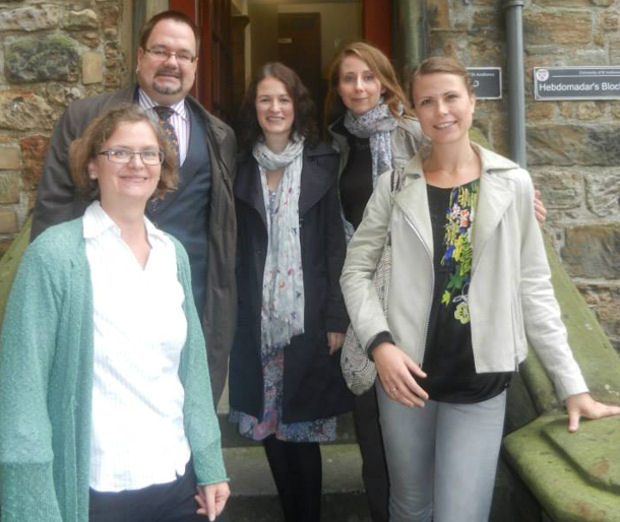
From left to right, Dr Lise Paulsen Galal, Torsten Moritz (CCME), Dr Fiona McCallum, Dr Marta Wozniak, Dr Sara Lei Sparre

Prof. Louise Richardson, Principal and Vice-Chancellor of the University of St Andrews and DIMECCE Project Leader, Dr Fiona McCallum
HERA JRP 2012 brochure
The brochure detailing all 18 projects funded by the HERA Cultural Encounters call including DIMECCE is available to download.

